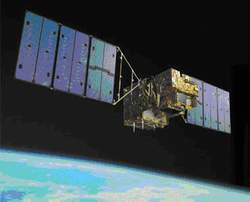January 28, 2009
Satellite to Monitor Global Greenhouse Gases Launched Successfully
Do you like this story?
 First of its kind satellite will help determine emissions levels; data to be shared with scientists for free.
First of its kind satellite will help determine emissions levels; data to be shared with scientists for free.
Bangkok (UN/ESCAP Information Services) – Efforts to tackle global warming received a boost today with the successful launch in Japan of a satellite to monitor greenhouse gases from space.
The Greenhouse Gases Observing Satellite “IBUKI” (or “GOSAT” in its English-language acronym) is the first satellite to observe greenhouse gases and monitor changes in the effects they cause. It was launched from the island of Tanegashima, in southern Japan, by the Japan Aerospace Exploration Agency (JAXA), a key partner of the United Nations’ regional arm – the United Nations Economic Commission for Asia and the Pacific (ESCAP) – in addressing disaster risk reduction and environmental issues.
Using a high precision sensor, “IBUKI” can measure from outer space the concentration of greenhouse gases throughout almost the entire surface of the earth, including large regions where data was never collected before. The obtained data will be used to determine the emission, transportation and absorption of these gases with a view to eventually contributing to controlling global warming.
Covering every region in the world, the satellite will play a fundamental role in monitoring an increase or decrease of greenhouse gases. After the operations start, the data will be obtained every three days from the observation points and distributed to scientists free of charge.
JAXA and ESCAP signed a Memorandum of Understanding (MoU) in December 2008 to collaborate on various emerging issues and challenges in the region, such as disaster risk reduction and the environment. Prior to the signing of the MoU, JAXA and ESCAP’s Information and Communication Technology and Disaster Risk Reduction Division implemented a series of activities and initiatives to promote effective use of satellite imagery and remote sensing in disaster management and risk reduction through the Sentinel Asia initiative, which aims to promote international cooperation to monitor natural disasters in the Asia-Pacific region.
The two organizations will continue and expand their collaboration, capitalizing on expertise and strengths of each organization, so as to promote evidence based decision making in disaster risk reduction and climate change. One of such occasions will be the First Session of the Committee of Disaster Risk Reduction scheduled from 25 to 27 March in Bangkok which will serve as a regional platform for national disaster management authorities in the region.










0 Responses to “Satellite to Monitor Global Greenhouse Gases Launched Successfully”
Post a Comment